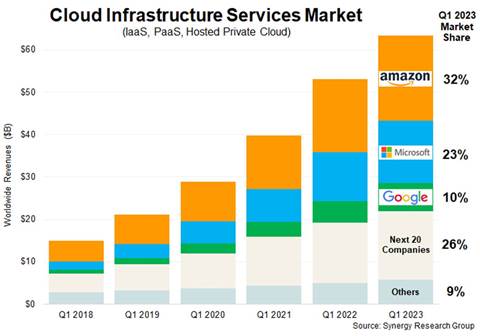The Big Three cloud infrastructure services providers continue to dominate the market, with numbers from Synergy Research Group suggesting their combined market share is 65 per cent of the total.
Looking at the public cloud market alone, the dominance of Amazon Web Services, Microsoft Azure and Google Cloud was even more pronounced, with the three holding 72 per cent of the total.
Synergy said enterprise spending on cloud infrastructre and platform as a service, and hybrid private cloud was more than US$63 billion in the first quarter of the year.
That represents a growth rate of 19 per cent year on year, similar to that of Q4 2022.
In terms of market share, Amazon has 32 per cent of the total, followed by Microsoft at 23 per cent, and Google at 10 per cent.
The next rung of cloud providers include:
- Alibaba - 4 per cent
- IBM - 3 per cent
- Salesforce - 3 per cent
- Oracle - 2 per cent
- Tencent - 2 per cent.
Smaller players with market share of one per cent or thereabouts include Baidu, China Telecom, China Unicom, Huawei, Fujitsu, NTT, Snowflake, SAP and Rackspace.
For the last quarter of 2022, Synergy found that enterprise spending on cloud jumped 21 per cent year on year, reaching US$61.6 billion.
However, that growth rate was down considerably on Q4 2021, when spending rose 36 per cent.
Synergy also found that Microsoft and Google had gained on AWS.
This was not repeated for the first quarter of the year, as Microsoft's market share remained the same as in Q4 2022, and Google's dropped by one percentage point in the same period of time.
"Economic pressures are crimping cloud spending in some quarters, but the foundational benefits of cloud adoption continue to drive the market to ever-higher levels," Synergy said.
A US dollar now trending downwards in value could provide some tailwinds for cloud growth in the Asia Pacific and Europe, Middle East and Africa regions, which combined account for more than half the global market.
China's large cloud market has also returned to growth, but Synergy it is telcos that have benefited more than traditional internet compancies.





_(27).jpg&h=142&w=230&c=1&s=1)


.jpg&h=142&w=230&c=1&s=1)




.jpg&w=100&c=1&s=0)








_(1).jpg&q=95&h=298&w=480&c=1&s=1)


